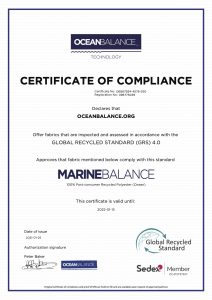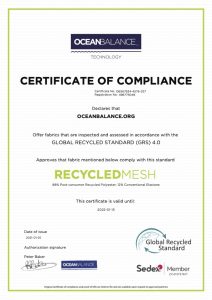Facts
Recovered Ocean waste plastics and post consumer plastic bottles are collected and brought to an approved recycling facility. At the recycling facility the conversion process of turning waste into wearable fabric begins:
• A flotation and separation process separates the different types of plastics and in the case of bottles removes the caps and labels from the bottles, as they are made of plastics with different characteristics.
• The selected Polyethylene Terephthalate materials are then processed into flakes.
• After being washed the flakes are melted.
• Yarns are pulled from the melted polyester.
• The result is a clean, valuable, and recycled raw material perfect for the textile fabric production.
• The raw filament yarns are spun into yarn and ultimately woven into variety of different Oceanbalance fabrics.
Almost every product has a manufacturing process that consumes energy and water, and produces carbon dioxide emissions and as such has an environmental impact.
• A flotation and separation process separates the different types of plastics and in the case of bottles removes the caps and labels from the bottles, as they are made of plastics with different characteristics.
• The selected Polyethylene Terephthalate materials are then processed into flakes.
• After being washed the flakes are melted.
• Yarns are pulled from the melted polyester.
• The result is a clean, valuable, and recycled raw material perfect for the textile fabric production.
• The raw filament yarns are spun into yarn and ultimately woven into variety of different Oceanbalance fabrics.
Almost every product has a manufacturing process that consumes energy and water, and produces carbon dioxide emissions and as such has an environmental impact.
In order to reduce the waste, we all have to make responsible decisions about which materials to use. For example, if we use 2 kg (4.4 lbs) of Oceanbalance yarn to make our Marinebalance fabrics we can:
• Save 3.785 litres of oil based products.
• Save enough water to provide drinking water to one person for five days.
• Save the amount of greenhouse gas emitted while driving a hybrid car for almost 25 Klm.
At Oceanbalance we not only create products made from 100% recycled polyesters, but we also use it in combination with other equally materials such as Recycled Elastane in order to create a wide range of sustainable performance fabric options.
Oceanbalance Recycled Polyesters are environmentally friendly, cost-effective and safe; the regenerated polyester fibre is made from recycled Ocean waste plastics and post consumer plastic bottles and performs as well as regular virgin polyester.
Here are some important facts about Oceanbalance fabrics:
• Oceanbalance recycling process requires 86% less water than manufacturing regular polyester.
• Making Oceanbalance fabrics consumes 70% less energy than regular polyester.
• The CO2 emissions in creating Oceanbalance fabrics are 75% lower.
• 1 kg of Oceanbalance fabric can keep the equivalent of 60 water bottles out of environment.
• Using Oceanbalance fabrics helps us to not only keep plastic out of the landfills and oceans, but also to save our natural resources.
• An average Rash guard or long-sleeved technical tee made from Oceanbalance uses the equivalent of 13 x 2 liter PET bottles.
All of the products are certified for safety and quality. Through third-party testing, all our fabrics are certified to The Global Recycling Standard

And in addition we test and make sure that there are no harmful substances including:
• No Formaldehyde
• No Phenols
• No Heavy Metals
• No VOC
We also use special eco-friendly treatments for breathability, UV protection and easy care.
• Save 3.785 litres of oil based products.
• Save enough water to provide drinking water to one person for five days.
• Save the amount of greenhouse gas emitted while driving a hybrid car for almost 25 Klm.
At Oceanbalance we not only create products made from 100% recycled polyesters, but we also use it in combination with other equally materials such as Recycled Elastane in order to create a wide range of sustainable performance fabric options.
Oceanbalance Recycled Polyesters are environmentally friendly, cost-effective and safe; the regenerated polyester fibre is made from recycled Ocean waste plastics and post consumer plastic bottles and performs as well as regular virgin polyester.
Here are some important facts about Oceanbalance fabrics:
• Oceanbalance recycling process requires 86% less water than manufacturing regular polyester.
• Making Oceanbalance fabrics consumes 70% less energy than regular polyester.
• The CO2 emissions in creating Oceanbalance fabrics are 75% lower.
• 1 kg of Oceanbalance fabric can keep the equivalent of 60 water bottles out of environment.
• Using Oceanbalance fabrics helps us to not only keep plastic out of the landfills and oceans, but also to save our natural resources.
• An average Rash guard or long-sleeved technical tee made from Oceanbalance uses the equivalent of 13 x 2 liter PET bottles.
All of the products are certified for safety and quality. Through third-party testing, all our fabrics are certified to The Global Recycling Standard

And in addition we test and make sure that there are no harmful substances including:
• No Formaldehyde
• No Phenols
• No Heavy Metals
• No VOC
We also use special eco-friendly treatments for breathability, UV protection and easy care.
Our Fabrics

















